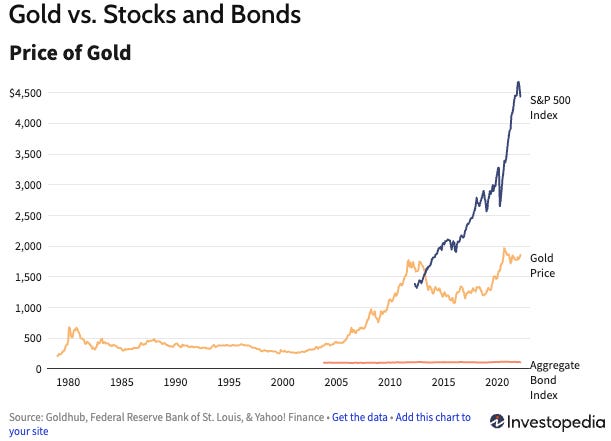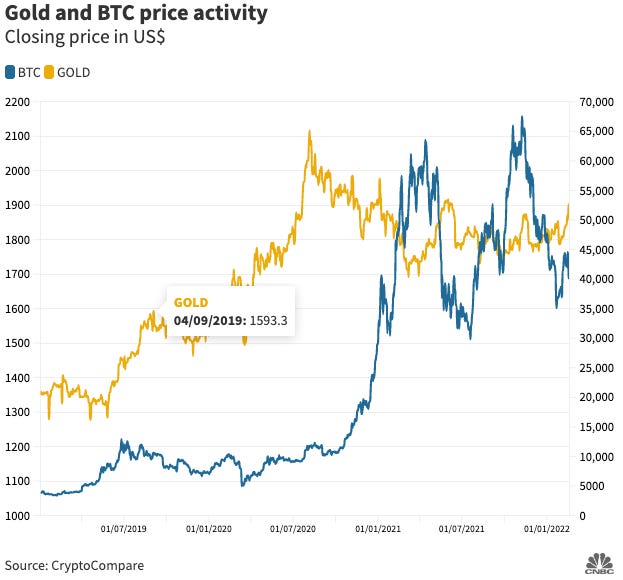Crypto Gave Us Blockchain, And That’s It…
Introduction
Let's start this week's blog with a couple of poll questions. I want to understand the sentiments of my readers on the crypto market overall and what are their thoughts on hedging or using crypto against inflation. So please take 5 seconds to answer the two questions below.
I learned about Bitcoin in Oct 2018, it had just surpassed $5k. Everyone was shocked that they missed the investment of their life by not investing in this currency. Some said they had invested but no longer have access to the crypto key. I had just started investing journey and also felt that I had missed this huge opportunity to become a millionaire. Fast forward to June 2022, I feel lucky that I did not invest and stuck to the value investing principles I was learning. In this blog, I will not take up what cryptocurrencies are and what is blockchain? This blog is to shed light on dark areas of Crypto and its use cases. I am very skeptical of Crypto as a currency. In today's blog I would like to cover the same and its failure in 2022, explaining why it's not a hedge against inflation and why the comparison of crypto/Bitcoin to gold is a farce.
Crypto and Greater Fool Theory
Crypto is an asset class. The reason anyone buys an asset is that it produces something. Like if you buy a farm (asset), you would look for the kind of crop it produces and what is the value of those crops in the market. So you not only own the asset but also what the asset has produced. Bitcoin is different, it's a non-productive asset and the only hope here is that the next person is willing to pay more than what you paid, and the next person wonders the same about the next in line and so the line goes.
Simply put this is the greater fool theory. It simply states that it doesn't matter if an asset is risky, has a massively inflated price, or is worthless. All that matters is that someone else is willing to buy it from you for more than you bought it. Remember the Beanie Babies. At one point in the late 1990s, a $5 toy mass-produced in China became such a big craze that people - mostly adults - paid thousands of dollars to collect them. But only a few years after Beanie Babies made their creator a billionaire, the stuffed animals became virtually worthless.
In Charlie Munger's words, "Bitcoin is worthless artificial gold". Crypto has no value, you cannot do anything with it, except sell it to someone else. So basically, crypto is a bubble where no one understands the value or use of the asset but is playing around to fool each other out. Remember the Tulip crisis of the 1700s.
Crypto failure of 2022
When a traditional bank fails, a SWAT team of regulators swoops in, winding it down in secret and preventing a panic that could spread throughout the financial system. In cryptocurrency banking, the demise happens in full public view—and there is no regulatory SWAT team to keep the markets calm.
On June 12th Celsius suspended all withdrawals from its lending platform. CEL (Celsius) plummeted 70% after hours in a single hour. CEL's major sell-off came amid a giant selloff that saw crypto’s total market capitalization plunge to less than a trillion, or more than two-thirds shy of its all-time high of $3 trillion, while Bitcoin dropped to levels not seen since 2020. For those who remember the 2008 "Lehman moment", a shattering of confidence triggered by plunging asset prices, liquidity freezing up, and billions of dollars wiped out in a few scary weeks.
What started with the demise of a stablecoin called TerraUSD USTUSD +8.65% —wiping out $60 billion—has now spread to the potential failure of a giant crypto bank. Bitcoin fell 30% over the past week and is now down 70% from its peak, trading around $21,000. Ether, the second-largest token, has dropped 77%, to $1,080. Overall, the token market has lost $2 trillion of value since last November, going down to $900 billion. Coinbase Global COIN +0.33% (COIN), the big, publicly-traded exchange, said this past week that it plans to lay off 18% of its workforce. BlockFi, another crypto lender, announced job cuts, as did Crypto.com.
The fear and greed index for crypto is at an all-time low, there is Extreme Fear. As fear of inflation rages, traders and investors are dumping assets in their portfolios that they deem risky. Shares of unprofitable companies have dropped swiftly, with many newly public technology companies losing more than half their value in the first half of the year. Also high on the sell list: crypto. The carnage has spread from the cryptocurrencies themselves to companies that provide services in the market. This flush out of cryptocurrencies is similar to that of internet and dot com companies in the 1990s. Supporters of cryptocurrencies have put crypto in line with gold. It is marketed as a hedge against inflation and recession. Let me explain why this comparison does not make sense and is completely wrong.
Crypto is not a hedge against inflation
For any asset to be a hedge against inflation, investors must actually believe that it will hold its value as inflation rises. It is very clear that this is not the case with Bitcoin. Bitcoin is only as valuable as investors feel that it is. It does not have any real intrinsic value as stocks do. Bitcoin is too volatile and too bubble-ish to be considered a safe haven of any sort. BTC (Bitcoin) has a certain allure of having no central bank behind it, meaning that there is no worry of currency manipulation or devaluation due to money printing.
This also means that its price is driven by pure supply and demand, or in simple terms, how many people are buying vs how many people are selling. Having no central authority issuing a currency can obviously backfire when there is a run on the currency, i.e. when you have too many people trying to sell, and not enough buyers. There is zero downside protection and investors can lose everything. It is virtually the same effect as if a government prints its way to prosperity (as it tried to do in Weimar Germany in the 1930s or in Zimbabwe in the 2000s). Gold was once believed to be a hedge against inflation. But did it really give the returns over the long term? Over the longer term, stocks (SP500) seem to outperform gold by about 3-to-1.
Bitcoin is different than gold
A lot of comparisons are made between Gold and Bitcoin. Bitcoin is referred to as digital gold by people who believe that two assets are comparable. First question's first, why is gold important here? As I mentioned earlier, gold was considered the hedge against inflation. A lot of investors flocked to gold as a safe haven but as I showed in the chart above, over the year gold has not returned the same value per dollar as stocks or SP500 in general. Having said that, historically Gold has performed well if a recession is threatening. During the Covid-19 recession, a lot of people flocked to gold skyrocketing the price from $1900 in late 2019 to $2100 in mid-2020. The sole purpose of calling gold a hedge against inflation and rising rates is its stead nature of holding value under uncertain times. Where Bitcoin or crypto has lost most of its value. Look at this chart below.
The core reason for the two to be different is that Bitcoin’s value doesn’t reside in an established history of commercial usage due to its anti-corrosive or conductive properties or long-established cultural tradition of how shiny is better. It resides in both the future value of online transactions conducted through its networks and also in a sense of belief that eventually, there will be a need to delegate financial trust and authority.
Conclusion
Bitcoin is intelligent computer science and that is it. It is great how decentralized databases can be used as a center of communication but Crypto itself has not found a valid use case. I do believe, that in-game purchases will be a valid use case that has real-world applications for cryptocurrencies. A lot of Web3-enabled and Metaverse games have in-game currencies that players use to buy and upgrade avatars and multiple other things. I am very skeptical about Web3 overall as well, and I put my reasons as to why Web3 will not be easy to implement.
To conclude, I would just say that crypto winter has started and will be a very cold one. It is advisable to move to a warmer place than stay in Antarctica and wait for assets to freeze over.
Cheers








